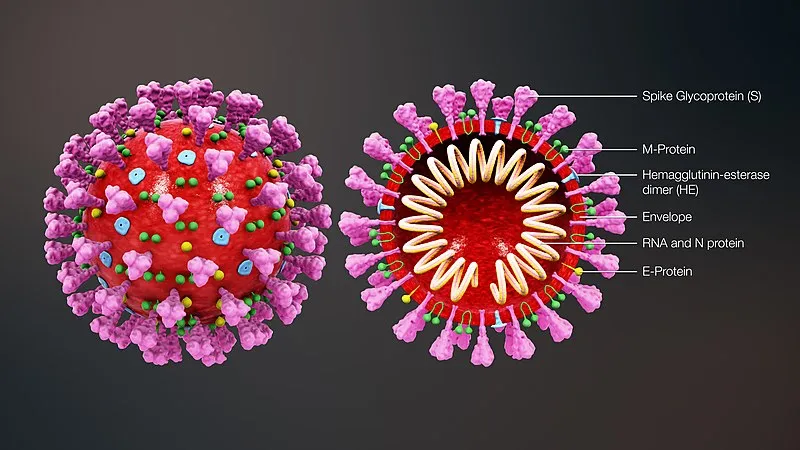
This is a pre-print publication of a medical hypothesis of me about the possible reduction of devasting case fatality rate of SARS-Co-V-infectet patients which develope COVID-19 disease and severe ARDS leading to lung failure
Author: Cord Uebermuth - published on March 1, 2020 - 03:05 UTC+1 on steemit.com as a preprint on the blockchain
Abstract
Background
The increasing number of deaths and increasing case fatality rate (CFR) with age of the infected patients of COVID-19 disease is a devasting event of SARS-CoV-2 infection. Little or nothing is known about the reason of the high CFR of the elderly population.
It has been reported the many fatalities at SARS-CoV-2-Syndrom are associated with other diseases like diabetes or lung affections as asthma. It is remarcable that male patients which are infected by the SARS-CoV-2 virus has a higher risk to die by the infection. It is even of interest to know the reason why young persons or chidren seldom develop a fatal outcome of the SARS-CoV-2 infection.
From the point of view of the author of this work a magnesium deficiency could be an important risk factor of fatal outcome of the COVID-19 diseas at infected patients. It is well known and decribed in the scientific literature that magnesium imbalance is leading to a disfunction of the immune system - for examble at theXMEN-disease. Cell-mediated immunity is the most effective immune response in removing virus-infected cells without causing a cytokine storm. A lack of magnesium and low serum levels of magnesium seems to be associated with immunodeficiency as we know by alterations of MAGT1 function at the XMEN disease.
Supplemention of Magnesium at patients with MAGT1-defect has shown many benefits to treated patients with XMEN disease - and even leads to tumor supression and is able to combat Ebstein Barr Virus infection. It is well known that with aging of the people and reduced activity the magnesium intake of old people is significant lower than in young people. Similar effects can be observed at patients which needs to use drugs - for example pantoprazol or omeprazol - or which have diabetes with kidney disease and often as a result of kidney dysfunction low magnesium levels.
Even alcohol intake is often combined with low magnesium levels of patients and injury of the liver leading to an imbalance of the immune system. The gender prevelance of alcohol dependence is more common in man than in women, so that alcohol induced low magnesium levels could cause deadly outcome of the SARS-CoV-2 infection.
At present there are no investigations of the SARS-CoV-2 induced COVID-19 disease which has measured the magnesium levels of patients and its correlation with fatality. If low magnesium levels are correlating with higher case fatality rates of COVID-19 patients, then a Mg-supplementation could from the authors point of view result in a better outcome of devasting acute respiratory distress syndrom (ARDS) of affected patients with SARS-CoV-2 infection and severe COVID-19 disease and even other Coronavirus disease such as MERS-CoV-Coronadisease or even SARS.
It is well described that low magnesium levels in vitro with HUVEC-cells are leading to enhancement of inflammation by increasing activity of NF-κB at low magnesium levels. (1) Such an inflammation induced by low magnesium levels could be responsible of devasting lung damage by ARDS in the background of the virus challenge.
On the one hand it is important to know that low NFkB activation leads to less virus replication, but on the other hand NFkB activation is able to cause severe inflammation. More clinical trials are necessary in order to find out if patients with low magnesium levels has more often a fatal outcome at COVID-19 than patients with normal or elevated mangensium levels a result of supplementation trials.
If so, then it should be discussed to improve the magnesium intake of infected patients at COVID-19 disease in order to avoid a fatal outcome ot ARDS at COVID-19 disease and similar avoid any kind of alcohol consumption. If not than - other reasons of the increased CFR in elderly and male patients should be discussed.
All right reserved.
Sources:
[1.] Magnes Res. 2018 Aug 1;31(3):99-109. doi: 10.1684/mrh.2018.0439.
Varying magnesium concentration elicits changes in inflammatory response in human umbilical vein endothelial cells (HUVECs).
[2] Mg2+ regulates cytotoxic functions of NK and CD8 T cells in chronic EBV infection through NKG2D
[3.] Control of SARS infection by CD-4 lymphocytes
Posted via Steemleo
Important note: The information provided here is based on the author's conclusions and own considerations. The author's conclusions do not represent any kind of therapy recommendation for emerging dieseas or infected patients, since there are still no clinical efficacy tests for these theoretical considerations for therapy of infectious diseases, which would prove a benefit for this type of treated patient - also if the author of this article is personally convinced that such therapy can be of benefit to infected patients. As there are no clinical studies to date on the use of lysosomal substances for virus infections in humans, as far as I know, therapeutic treatments with these substances should only be carried out as part of a clinical trial in suitable centers. The use of drugs mentioned in this article as part of an off-label use in the case of coronavirus infection is explicitly discouraged due to the lack of data in human use until now, as long as the benefit of appropriately treated patients with consideration of the side effects of such therapies is proven in controlled studies could.
This contribution is only intended to encourage scientists to make increased efforts to develop adequate antiviral therapies that have a broad spectrum of antivirals. They are to be understood by the author of this article as a medical-theoretical contribution to the improvement of medical care for people all over the world - but do not include any kind of trade request for their practical implementation in humans without prior clinical examination by appropriate centers.
Off-label use of such experimental therapeutic strategies in the case of emerging viral diseases is at present not recommendet by the author of this article. The presented informations are only representing theoretical therapeutic strategies mentioned by the author to induce further clinical investigations in the field of emerging infectious diseases in future
